Statement at the 13th Economic Cooperation Organization Summit
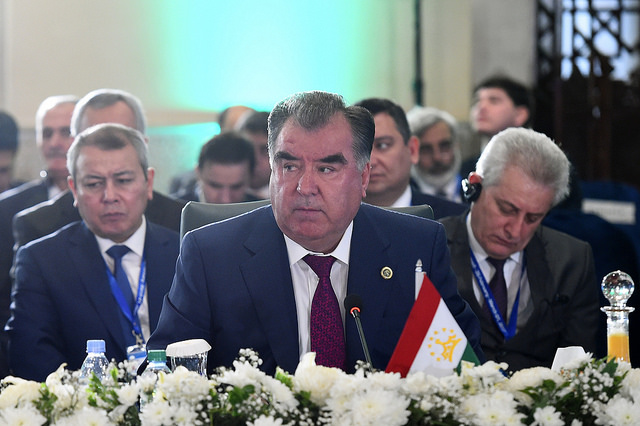
Distinguished Mr. Chairman,
Excellencies, Heads of State and Government,
Distinguished Friends,
At the outset, I would like to extend my sincere gratitude to the Government and the Prime Minister of the Islamic Republic of Pakistan, H.E. Mr. Muhammad Nawaz Sharif, and to the people of fraternal Pakistan for the warm hospitality and favorable working environment.
The Summit arrangements at high level apparently demonstrate the continuous attention paid by the Leadership of Pakistan to enhancement and promotion of regional cooperation.
It is very symbolic that this Meeting of the Heads of the ECO member countries is taking place on the eve of the 40th anniversary of the Izmir Treaty, which laid foundation for the activities of the Organization.
I would like also to emphasize that this year it will be 25 years since the Central Asian countries, Azerbaijan and Afghanistan joined this Organization.
Geographical expansion of ECO through accession of these countries doubled its capacity and geostrategic importance in three integral regions of the continent – Central, Western and South Asia.
It is obvious that over the past period, we have made certain achievements in development of our multilateral cooperation.
Our joint efforts made it possible to establish a legal framework of our cooperation in priority areas and created a favorable environment for expansion of trade, movement of people and transit operations between our countries.
Alongside with this, we have implemented a number of important infrastructure programs and expanded humanitarian and cultural cooperation between our countries.
Development and expansion of multifaceted cooperation with the ECO member countries is one of the important dimensions of Tajikistan’s foreign policy.
Currently, the share of ECO member states in Tajikistan’s foreign trade accounts for over 36 percent.
Despite all these achievements, the ECO member states still have a great untapped potential for mutually beneficial cooperation.
Therefore, today’s meeting has a particular significance.
This meeting provides an opportunity to discuss issues related with the enhancement of our cooperation and to identify the main directions of the Organization’s activities in future by taking into account the current state of affairs.
It is our common task to find out the means and framework for effective cooperation, which meets the interests and desires of our peoples, and to ensure their implementation.
Promotion of a wider integration, activation of mutual support, expansion of trade and investment as key elements of regional cooperation are among the areas, which we need to acknowledge as strategic objectives.
In the current context, formulation of an adequate transport and transit system is an influential tool for promotion of trade development.
Alongside with this, effective use of energy resources and establishment of energy grid system remain among the important aspects of our cooperation.
In this regard, at present and in the nearest future, we need to pay double attention to the implementation of joint infrastructure projects that facilitate connectivity of transport and energy networks of the ECO member countries.
In addition, we also need to attach particular attention to ensuring that the Organization’s project activities will promote socio-economic development, poverty reduction and improve the living standards in the member-states.
Within the Organization, we can apply our own potential to connect our roads and sea routes through the establishment of transport corridors and thereby strengthen our economic growth and potential in addressing social issues.
We also hope that the ECO member states will further contribute to the implementation of projects on connectivity and establishment of regional energy grids and creation of energy market.
In this regard, the implementation of the high-voltage electricity transmission line – CASA-1000, which is acknowledged to be the first energy bridge between South and Central Asia regions, is a timely initiative.
I would like to recall that we officially launched the construction activities within the CASA 1000 project in Dushanbe last year in May with participation of the Heads of State and Government of the project country participants – Pakistan, Afghanistan, Kyrgystan and Tajikistan.
We hope that this strategic project will make it possible to connect the energy grids of the countries of the two regions and promote the achievement of the Sustainable Development Goal 7 – ensure access to affordable, reliable, sustainable and modern energy for all.
Hydropower plants make the core of the energy sector in Tajikistan, which generates 98% of power in our country with the use of renewable energy sources.
Tajikistan is among the top six countries of the world in terms of “green energy” generation and it is ranked as one of the countries with huge hydropower resources.
The hydropower potential of the country is 527bn kw/hours of environmentally friendly electricity per year of which we currently use only five percent.
This is despite the fact that the ECO wider region’s energy market demands for energy are continuously growing.
With a view to ensuring power generation and consumption, the Government of Tajikistan continuously undertakes measures on rehabilitation of the existing power plants, construction of new energy facilities, wider use of other renewable energy sources and introduction of modern energy saving methods.
These measures, alongside with ensuring energy security at the national level, are also of regional importance, since they are aimed at meeting the ever growing demand of our far and close neighbors in energy.
There are two more important aspects in the set of water issues, which deserve the ECO member states’ attention.
First, population growth in the region and everyday growing need in water resources due to ensuring food security, which creates new tasks.
In this context, wider introduction of integrated water resources management and effective water use should be another direction of our cooperation.
Second, climate change has been accelerating due to the global warming. Unfortunately, our countries are hit by the negative impact of this process and consequences of water related natural disasters.
For instance, in Tajikistan natural disasters annually cause huge economic losses and human casualties.
Extensive rains and floods, mudflows and landslides, high level of snowfall and avalanches cause huge losses to our economy and create obstacles for sustainable social and economic development.
Our view is that it is high time to develop and implement a proper partnership program within the Organization on natural disaster risk reduction and mutual emergency support.
Another promising area of our cooperation is tourism, on which I would like to elaborate some thoughts.
Tajikistan has a favorable climate, beautiful nature with unique landscapes and many historical and civilizational sites attracting tourists.
Given these opportunities, the Government of Tajikistan has been developing and implementing specific public programs on tourism development.
Within these programs we envisage a number of privileges and benefits in the tourism sector, including for import of equipment and other materials for development of tourism infrastructure.
There is no doubt that expansion of cooperation between the ECO member states in this area would serve as another influential factor for sustainable development of our countries and as an effective tool for strengthening people-to-people ties.
Ladies and Gentlemen,
Regional cooperation for establishment of peace and stability in Afghanistan and the entire region still remains as one of the important common objectives.
In this regard, Tajikistan welcomes the involvement of its close neighbor – Afghanistan into the regional integration process.
Therefore, we support the activities of the ECO Special Fund for Reconstruction of Afghanistan and implementation of the Action Plan on rehabilitation of social infrastructure in the country.
Afghanistan is located at the Eurasian crossroad and can serve as a transit hub for expansion of trade between the countries of Europe, Asia and the Middle East.
Human resources development in Afghanistan and training of professionals on the required civil specialties is one of the important priorities in the Tajik-Afghan Cooperation Program.
Currently hundreds of Afghan students study in Tajikistan. In addition, we have decided to allocate up to 1000 educational scholarships for Afghan citizens until 2025.
It is well known that over last years the world community has been actively developing and adopting a number of globally important documents defining the aspects of sustainable development till 2030.
The new UN Sustainable Development Agenda will play an important role for ensuring the aspirations and desires of our peoples for a just and decent future.
This agenda clearly defines sustainable development goals and objectives in three important priority areas – economic growth, social development and environmental protection.
In this context, we welcome the development of a new document – ECO Vision 2025, the main objective of which is to ensure adequate and timely achievement of SDGs in the ECO region.
The document defines the main directions of our mutual cooperation in the near future.
We hope that this “roadmap” will substantively facilitate the achievement of our objectives in this area and enhancement of trade and economic ties as well as solidarity and integration between our countries.
We are of positive view on this key document, and believe that its effective implementation will further improve the Organization’s reputation at the international stage.
Distinguished Friends,
Last year, the United Nations General Assembly adopted its resolution entitled “International Decade for Action “Water for Sustainable Development” (2018-2028) at the initiative of Tajikistan and the proactive support of the ECO member states. I would like to avail myself of this opportunity to extend my gratitude to all ECO member states for supporting this initiative, which was approved unanimously.
I believe that the ECO will proactively participate in implementation of the new Decade and will also substantively contribute to implementation of water related objectives and targets.
The Government of Tajikistan is keen to have civilized relations and wide range real cooperation with all friendly countries as well as regional and international organizations.
This is the core of our foreign policy which is based on the acknowledged and imperishable principles of sustainable friendship, equal rights and mutual trust and respect.
Accordingly, we stand ready to expand our partnership with all ECO member states in the areas of mutual interest.
In conclusion, I would like to wish success to the 13th Meeting of the Heads of ECO member states.
I hope that the outcomes of the Summit will serve as another decisive factor for further enhancement of mutually rewarding economic cooperation between our countries.
Thank you for your attention.











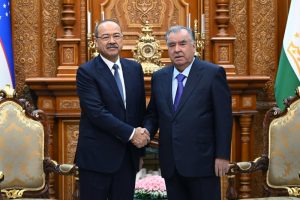 President Emomali Rahmon Receives the Prime Minister of the Republic of Uzbekistan Abdulla Aripov
President Emomali Rahmon Receives the Prime Minister of the Republic of Uzbekistan Abdulla Aripov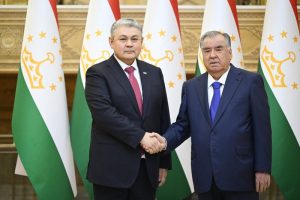 President Emomali Rahmon, Received the Minister of Foreign Affairs of the Republic of Kazakhstan
President Emomali Rahmon, Received the Minister of Foreign Affairs of the Republic of Kazakhstan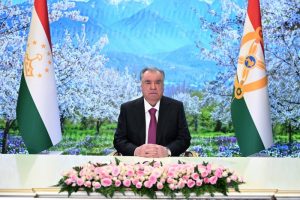 President Emomali Rahmon Sends Festive Greetings to President Xi for Chinese New Year
President Emomali Rahmon Sends Festive Greetings to President Xi for Chinese New Year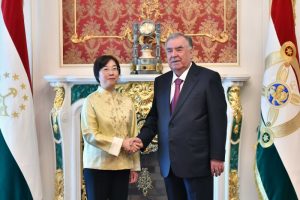 President Emomali Rahmon Receives AIIB President Zou Jiayi in Dushanbe
President Emomali Rahmon Receives AIIB President Zou Jiayi in Dushanbe President Emomali Rahmon to Hold Series of Meetings in the Coming Days
President Emomali Rahmon to Hold Series of Meetings in the Coming Days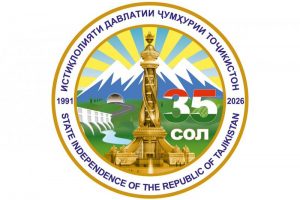 President Emomali Rahmon Approves Emblem for the 35th Anniversary of Tajikistan’s State Independence
President Emomali Rahmon Approves Emblem for the 35th Anniversary of Tajikistan’s State Independence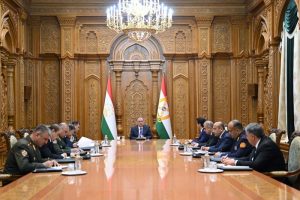 President Emomali Rahmon Holds Working Meeting with Heads of Security and Law Enforcement Agencies
President Emomali Rahmon Holds Working Meeting with Heads of Security and Law Enforcement Agencies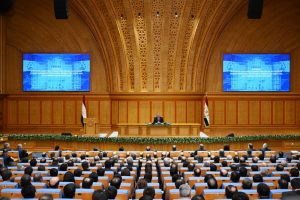 Expanded meeting of the Government of the Republic of Tajikistan
Expanded meeting of the Government of the Republic of Tajikistan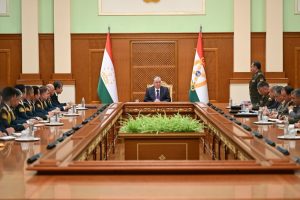 President Emomali Rahmon makes personnel appointments
President Emomali Rahmon makes personnel appointments














